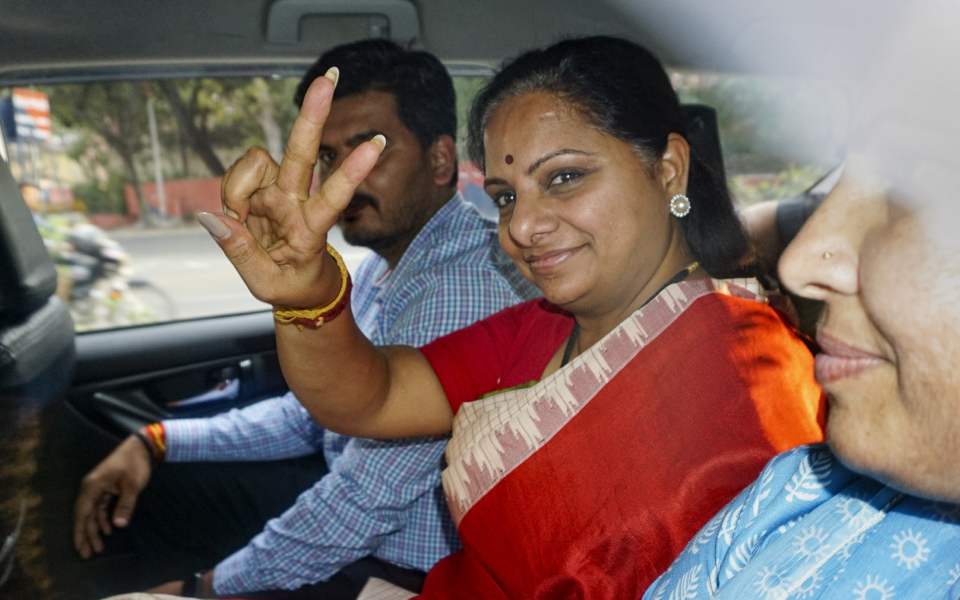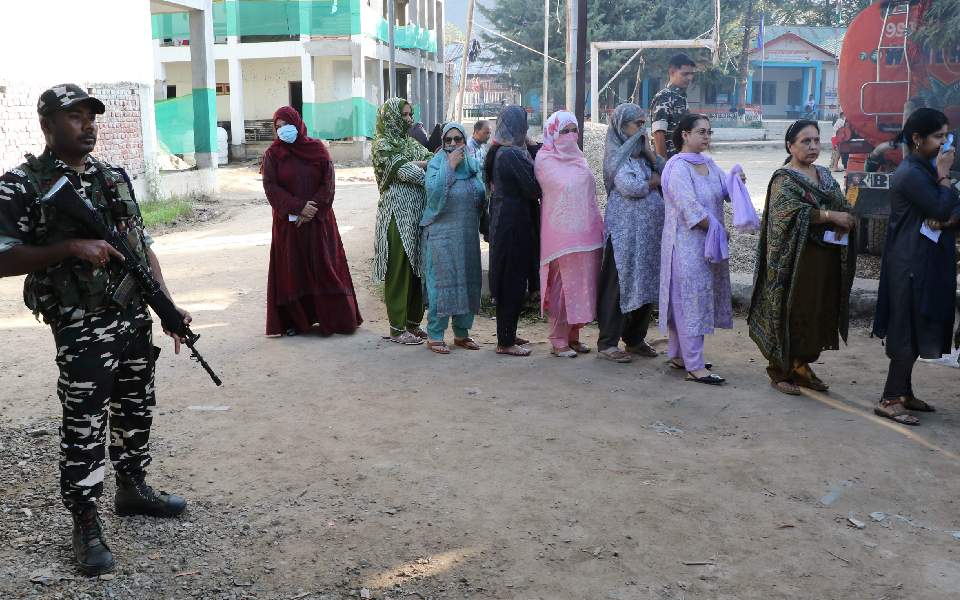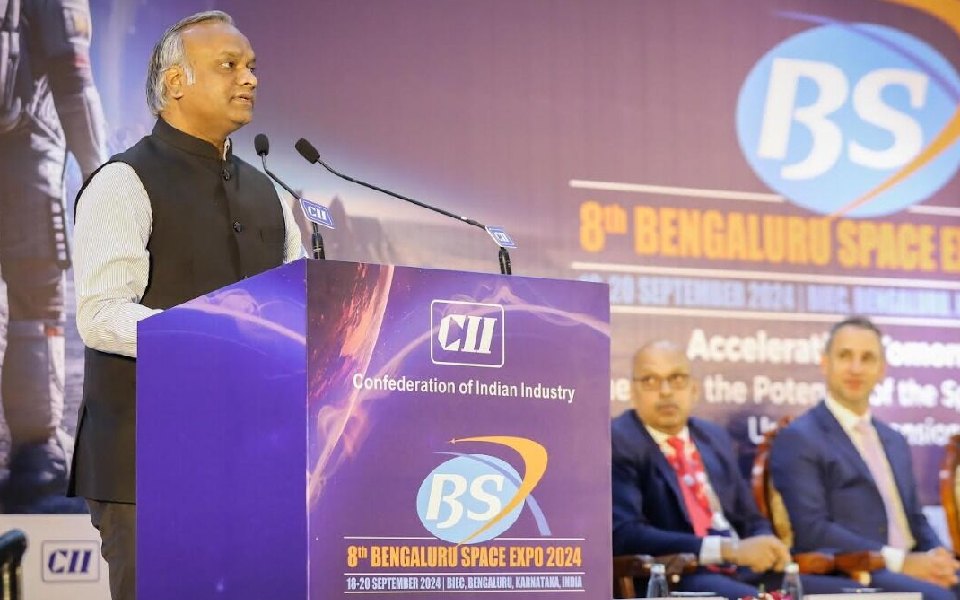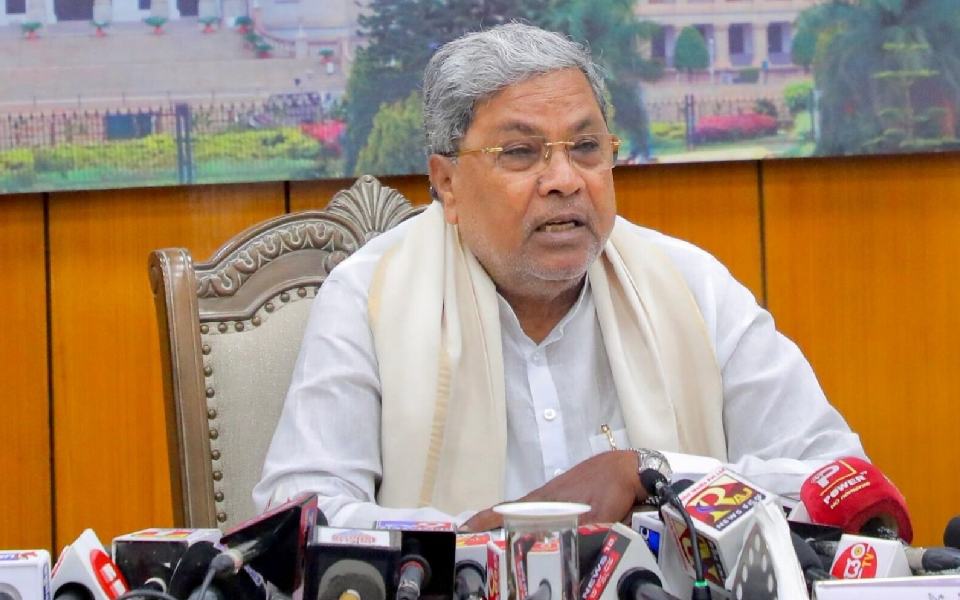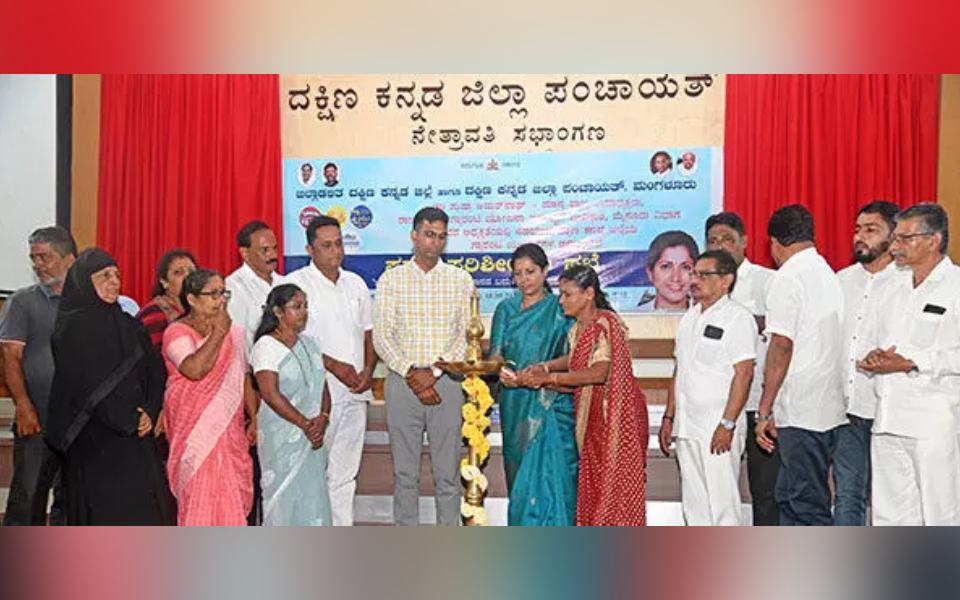New Delhi, Mar 16: Bharat Rashtra Samithi (BRS) leader K Kavitha, allegedly a key member of the "South Group", which has been accused of paying the ruling Aam Aadmi Party kickbacks of Rs 100 crore in return for a big share of liquor licences in the national capital, was on Saturday remanded in ED custody till March 23 in a money laundering case linked to the Delhi excise policy "scam".
Kavitha, a member of the Telangana Legislative Council and daughter of former state chief minister K Chandrashekar Rao, was produced before Special Judge for ED cases M K Nagpal, who sent her to the custody of the federal anti-money laundering agency for a week. The ED had sought her custody for 10 days.
Kavitha, 46, was arrested from her Banjara Hills residence on Friday amid protests by BRS supporters.
Her remand came on a day Delhi Chief Minister Arvind Kejriwal appeared before a metropolitan court in connection with two complaints filed by the Enforcement Directorate against him for skipping summons in the money laundering case linked to the alleged excise policy scam.
Kejriwal, who skipped eight ED summonses before turning up at the court, was granted bail. His senior party colleagues-Manish Sisodia and Sanjay Singh-are in jail for their alleged involvement in formulating and implementing the excise policy 2020-21 which drastically raised the profit margins of liquor wholesalers and retailers. The ED has claimed Delhi's ruling dispensation extended them the favour in return for money.
While being produced before the judge, Kavitha termed her arrest as illegal and asserted, "We will fight it out in court."
During the hearing, senior advocate Vikram Chaudhari, appearing for Kavitha along with advocate Nitesh Rana, told the judge her arrest was "illegal".
The counsel also accused the federal anti-money laundering agency of flouting the Supreme Court direction while arresting her. They claimed the apex court had directed the ED to not take any coercive action against Kavitha before it hears her plea against the summons issued by the agency to her on March 19.
"It is a black day that SC orders are violated, that an officer thinks he/she is above law," the counsel told the court.
The ED, however, said it has not made any statement before a court, including the Supreme Court, that no coercive action will be taken against Kavitha.
"There is enough evidence, witnesses' statements against K Kavitha in the case," the ED said.
The agency also accused Kavitha of destructing evidence in the case.
"We have summoned several witnesses to confront K Kavitha with," the agency told the court.
Though Kavitha has not been named as an accused in any chargesheet filed by the ED, the agency has claimed she was a key figure of the "South Group" who made benami investments in beneficiary liquor companies.
Let the Truth be known. If you read VB and like VB, please be a VB Supporter and Help us deliver the Truth to one and all.
Jammu, Sep 18: A voter turnout of about 59 percent -- "the highest in the past seven elections" -- was recorded in the first phase of assembly polls in Jammu and Kashmir on Wednesday, Chief Electoral Officer P K Pole said.
However, these are tentative figures and may rise after the final reports are received about postal ballots, and from remote pockets like Marwah, Wadwan, Dachhan and Machail in Kishtwar, the officer said.
Briefing mediapersons here after polling ended at 6 pm, Pole said the elections -- which covered 24 seats in seven districts -- ended peacefully without any untoward incident.
There are reports of some minor incidents of scuffle or argument from a few polling stations but "no serious incident" occurred that could have forced a repoll, he said.
Over 2.3 million voters were eligible to cast the ballot to determine the fate of 219 candidates, including 90 Independents.
"The polling percentage of 59 percent is highest in the past seven elections -- four Lok Sabha polls and three assembly elections," he said, attributing the increase in the voter turnout to various factors including improved security situation, active participation of political parties and candidates and a campaign by the department.
He said Kishtwar district recorded the highest 77 percent turnout, while Pulwama district witnessed the lowest 46 percent.
Doda district recorded a turnout of 69.33 percent, Ramban district 67.71 percent, Kulgam district 61.57 percent, Anantnag district 54.17 percent and Shopian district 53.64 percent.
In the 2014 assembly elections, the district wise poll percentage was: Pulwama 44 percent, Shopian 48 percent, Kulgam 59 percent, Anantnag 60 percent, Ramban 70 percent, Doda 73 percent and Kishtwar 76 percent.
In Kishtwar districts, he said, the Padder-Nagseni segment recorded the highest 80.67 percent voting followed by Inderwal (80.06 percent) and Kishtwar (78.11 percent).
In the nearby Doda district, Doda west segment recorded 75.98 percent, Doda (70.21 percent) and Bhaderwah (65.27 percent).
In Ramban district, Banihal segment recorded 71.28 percent and Ramban 67.34 percent, he said.
Among the seven constituencies of Anantnag district, Pahalgam recorded the highest voter turnout at 67.86 percent, followed by Kokernag (58 percent), Dooru (57.90 percent), Srigufwara-Bijbehara (56.02 percent), Shangus-Anantnag (52.94 percent), Anantnag West (45.93 percent) and Anantnag 41.58 percent, Pole said.
In Pulwama district, the CEO said, the Pulwama segment witnessed 50.42 percent polling, followed by Rajpora 48.07 percent, Pampore 44.74 percent and Tral 43.21 percent.
In Shopian district, the Shopian segment recorded a voter turnout of 54.72 percent and Zainapora 52.64 percent.
In Kulgam district, D H Pora recorded a turnout of 68 percent, Kulgam 62.70 percent and Devsar 57.33 percent, Pole said.
He said seven districts of south Kashmir had been traditionally low poll percentage constituencies and in some of the past elections, the percentage had not even crossed the single digit.
Asked about a social media video purportedly showing a policeman losing temper and aiming his gun before being overpowered by his colleagues outside a polling station in Kishtwar, he said the district election officer and the returning officer concerned have taken note and issue was resolved amicably.
PDP and BJP candidates were involved in an argument at the polling station.
Pole expressed hope that the remaining two phases on September 25 and October 1 will also see high polling percentage.
Meanwhile, the election commission expressed satisfaction over the long queues of voters at the polling stations showcasing the entire world, the deep trust and confidence of the people of J&K in the democratic exercise.
The polling was held across 3,276 Polling Stations in the seven districts and 24 special polling stations set up for migrant pandits in Jammu, Udhampur and Delhi.
According to officials, 31.42 percent of the more than 35,000 eligible kashmiri migrant voters exercised their franchise. While 27 percent cast their votes at 19 polling stations in Jammu, 40 percent at four polling stations in Delhi and 30 percent at one polling station in Udhampur.
In each of the seven districts where voting was held in the first phase, the voter participation exceeded the participation during the Lok Sabha 2024 elections, the election commission said in a release.
The performance builds on the trend witnessed during the Lok Sabha elections in Jammu and Kashmir which saw a voter turnout of 58.58 percent at polling stations, highest in the last 35 years.
Voting began at 7 am and proceeded steadily through the day. Men and women, the young and old, some too frail to walk and others patiently waiting their turn, queued up outside polling booths across Kashmir Valley and Jammu.
Security forces fanned out to ensure that there was no trouble. The day was largely without incident except for reports of clashes between political workers in some areas of Bijbehara and D H Pora.

